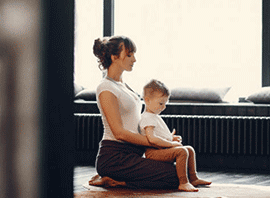Sleep. It’s that commodity for every parent, that’s more precious than gold. It’s not just that it’s very very important for a growing child, it’s for a parent that it matters too!
As you might know already, we have six kids in our family. Yep, true story, and strangely, somehow, we’ve ended up with two different generations and types of sleepers. Our first three kids all seemed to have terrible problems getting to sleep. They would be up and down each evening, driving us mental with their outlandish excuses and justifications as to why they needed to be out of their warm beds. But, on the upside, they were children who were likely to sleep in. Our younger three children, on the other hand, are the complete opposite. When they get to their bed in the evening, they have spent every last piece of whirlwind energy during the day, and when their head hits the pillow, they’re out for the count. I sometimes forget they’re there. This, however, is counter-balanced in the morning, when they very very energetically jump out of bed and are instantly at full-tilt, volume-up and ready (quite literally) to attack the day. No caffeine is ever quick enough or potent enough for these tornados.


But, having confessed to the challenges we face, for the most part, our kids have slept through the night. Sure, the occasional interruptions with a bad dream or a spew bug, but generally speaking, they’ve been solid sleepers, from the earliest days. Now, I tell you the challenges we had so I don’t sound like one of those over-zealous, Stepford-mums. Trust me, my household is just like yours. However, with this strategy, we’ve been able to establish a good sleep regimen from a reasonably early start.
MY SECRET?
Rhythm, rhythm, rhythm..
It all comes down to your evening RHYTHM. It will set the scene for the next 12 or so hours that stretch ahead of her (and you!). So, lean in. You’ll note I say rhythm (not routine) and I do this intentionally. If you keep to a rhythm YOU get to call the shots, not the clock. A routine is clock-focussed, whereas a rhythm is about what you do and how you do it. Whilst surprises, for the most part, are fun things, they don’t work in anyone’s favor when it comes to creating a predictable bedtime rhythm. It’s all about keeping it the same. This rhythm teaches the baby what to expect, and in turn, she will learn what others expect of her. By relying on a rhythm, you won’t lose your marbles when daylight savings hits. And when you’ve got your heels on and heading out on a date, this will enable you to get baby into bed early, with little problem. You might need to darken her room a little, but she should sleep well regardless - a win for everyone! So, what’s a good example of a ‘rhythm’, and what does it look like? It’s as simple as BATH, BOOK, SONG, BED - but the way in which it’s done repetitively each time is what makes it work a treat.


1. BATH
Fill a nice, deep, warm bath and pop some bubbles in. Spoiler alert: this bit is for BABY. You might be DYING to get your poppet into bed, especially with the thought of your own soak, but resist the temptation to rush this bit, it’s important. Keeping it CALM is KEY. You can give the baby a bath as early as you’re hoping to put her to bed (within reason of course). Let her get warm and clean and keep it peaceful. Pop a few drops of essential oil like lavender in and avoid the flashy, noisy stimulating toys altogether. Keep it low-key. This one’s a little age-dependent, however, as you supervise her, use the time to engage her in conversation about her day.
What was her least favorite part of the day? This helps your small child process her day and her feelings and lessens the likelihood of nightmares - a sleep disturbance you can both do without. Dr Laura Kauffman states, ‘Tension and anxiety leading up to bedtime can often filter into a child’s dreams. This will increase the likelihood of nightmares’. Keep it peaceful, and you’ve got the best chances of an undisturbed night’s sleep. Have her jammies ready, so she keeps warm after the bath, and slip her straight into bed.


2. BOOK
Get her to choose her book before bedtime. Whether it’s one book or two, stick to it. It’s important to be a little militant about this one. If you give in to three books one evening, trust me, you’ll be reading 8 by the end of the week. Try to decide together what to read before she gets in the bath and pops it on her pillow so it’s ready (and not up for negotiation later). Snuggle up together and read to her as she’s lying in her bed. Talk through what you see together on each page. This affords another opportunity to bond and enjoy the activity together. This builds connection and adds to your child’s feelings of safety and security and reinforces to her that she’s loved, valued, and understood. A perfect scenario to lead into a seamless sleep.
3. SONG
I’ve sung ‘You are my sunshine, my only sunshine’ EVERY night to our littlest now for six years. It’s a special little thing between just her and I and we both love it. The truth is though that I could be singing it in my least-enthusiastic voice, and it would still be essential to her long, happy sleep rhythm. She expects it and it ALWAYS happens. Sometimes it’s not me, but daddy or Grandma, but it always happens, it’s part of her rhythm and that is important to her night’s sleep.
Soothing songs for babies can help promote better sleep by creating a relaxing and calming environment. Music can help to reduce stress and anxiety in babies and promote a sense of comfort and security. Lullabies, soft instrumental music, and white noise are all popular choices for helping babies fall asleep and stay asleep.
Research has shown that listening to music can also have a positive impact on a baby's cognitive development, language skills, and memory. It can also help to improve their mood and reduce fussiness, which can lead to better sleep patterns. Overall, incorporating soothing music into a baby's bedtime routine can be a helpful tool in promoting healthy sleep habits.


4. BED - lights out.
Make sure her bedding is appropriate for the night ahead of her so she doesn’t wake too hot or too cold. And you’re set. For some, final goodnights may include some special kisses or prayer, but again, don’t get conned into a thousand different kisses and an all-night prayer vigil. She’ll try it on you, remain consistent!
As your little one gets older, this time provides the perfect opportunity for your child to drop their day’s bombshell. Be ready for it and listen and respond to their needs… these can be your child’s most teachable moments of all. But as I said, don’t get ‘played’, it’s BEDTIME! Sleep is at its best when it’s habitual. Body clocks and your natural rhythms and cycles all revolve around your sleep. Mine for that golden slumber using the simple: BATH, BOOK, SONG and BED rhythm and you’ll be set for the most seamless sleep.
Better Sleep for You & Your Baby - TIPS
TIPS 1: Make sure your baby has active play time, like “tummy time,” during the day.
TIPS 2: Respond to your baby’s needs quickly during the day.
TIPS 3: Keep the crib in your room and put your baby in when they begin to look tired. This helps them learn to fall asleep on their own.
Tips 4: Keep a journal of when your baby sleeps so you can learn their routine and rest when they do.
TIPS 5: Before bedtime, do a few calming activities with your baby, like bathing, gently massaging their muscles, or reading to them.
TIPS 6: Talk or sing softly to your baby before they go to sleep. Just the sound of your voice is very soothing to your baby.
TIPS 7: Wear a sling or hold your baby while they are awake, keeping the fabric away from their nose and mouth.
TIPS 8: If your baby seems restless at bedtime, put them to bed 30 minutes earlier. When overtired, babies can become energetic to fight off sleep.
TIPS 9: Play soft music, turn on a fan, or put a ticking clock near your baby’s crib.
TIPS 10: Place a warmed towel on the crib sheet and remove it just before placing your baby in the crib on their back.
How To Get Baby Sleep Through The Night:
1. Establish a bedtime routine.
It’s never too early to get a bedtime routine started. Your bedtime routine should be simple and sustainable, so it’s easy for you to do every night. Even the smallest change in your baby’s routine can leave them feeling off, and suddenly waking more frequently at night. Include calming, soothing activities that your baby seems to respond to, like swaddling and shushing. The bedtime routine can be where you create positive sleep associations for your baby.
2. Teach your baby to self-soothe, which means trying your best to soothe them less.
When your baby wakes in the middle of the night and cries for you, it’s always okay to go check on them. However, try and limit your time in there with them. Make it clear that it’s still time to sleep, not play or eat. Place your hand on their chest for a few moments to calm them, then leave the room (making sure to place your baby on their back to avoid sudden infant death syndrome). The Zen Swaddle and Zen Sack are gently weighted on the chest and sides, which make your baby feel like you’re still there. This can help ease separation anxiety, break the sleep association to be held to fall back asleep, and help your baby learn to self-soothe.
3. Start weaning the night feedings.
Once you get the okay from your doctor to stop night feedings, you should slowly start to reduce them. In many cases, feeding becomes a sleep association because you fed your baby every time they woke up. Just because that’s no longer necessary, doesn’t mean your baby won’t want it anymore. Slowly wean them off the night feedings (maybe try a dream feed?), feeding them less and not as frequently over a few days or a week to get them used to not feeding every time they wake.
4. Follow a schedule.
Make sure your baby is getting the right amount of daytime sleep to prepare them to get the right amount of nighttime sleep. As newborns, babies can’t differentiate between day and night, they just sleep ‘round the clock. As they get older, they start sleeping longer periods, the longest stretches being at night. If they're sleeping too much during the day they won’t stay asleep as long at night. Take a look at our sample newborn sleep schedules for some suggested guidelines.
5. Keep a calming ambiance.
Ambiance can be everything! Keep the room at a comfortable temperature, make sure it stays dark, and even try adding some white noise in there! The softest of sounds can disturb your baby at night, the white noise will provide a consistent, soothing sound for them to fall asleep to, and it will drown out any other noises happening around the house.
6. Stick to an appropriate bedtime.
Putting your baby to sleep later in the hopes that they’ll sleep later in the morning most likely won’t work. If you’re following a schedule, it’s important to keep a regular bedtime for your little one to keep them on track and to help your baby sleep at more appropriate times. Remember, newborns don’t have a set bedtime, because they’re just sleeping whenever they need to. But around 3 months old, you can start to establish a healthy bedtime to accompany your sleep schedule.
7. Be patient.
If your baby was sleeping through the night on their own before, and suddenly stopped, it might be a sleep regression or growth spurt’s fault. Growth spurts usually only last a few days, and then your baby should return to normal patterns and be able to sleep for hours at a time. Baby sleep regressions, including the infamous 4 months sleep regression, usually last 1-4 weeks. Be patient during times like this and focus on the fact that it won’t last.














Validate your login
Sign In
Create New Account